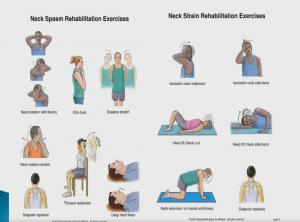Since the outbreak of the epidemic, everyone has been affected in various ways, and no one is unaffected. For example, children have switched from face-to-face classes to online classes, and most office policies have also changed from traditional face-to-face work to work from home. All the industries have been affected in various ways.
According to a survey by Ipsos Market Research Group, the proportion of Malaysians working from home(WFH)is higher than the global average, and their pressure is relatively high. Most of the stress comes from the changes in daily life, family pressure and other factors.

Examples of stretching exercises that people can do to ease the impacts of working from home.
INTI International University’s Faculty of Health and Life Sciences held a virtual symposium titled Body & Posture – Impacts of Work From Home on 24 July 2021. A line-up of speakers from different backgrounds came together to talk about WFH and how WFH affects our posture, our mental health, and our muscles.
The Power of the Pandemic
According to Dr K. M. Premkumar, a senior physiotherapist of a government agency based in India, a pandemic is a sudden outbreak that becomes very widespread and affects a whole region, a continent, or the world due to a susceptible population. A pandemic may cause a high degree of mortality.
“Before the Coronavirus outbreak, there are 80% of clinicians and 20% of administrative work, but now it’s the opposite, with 20% of clinicians and 80% of administrative work. People spend more than 40 hours working in front of the computer, therefore, it will bring some impact to our body and mind,” he said.

A group photo of speakers and participants of the online symposium titled Body & Posture – Impacts of Work From Home.
The Results of WFH
Dr Lavanya Prathrap, an Assistant Professor of the department of Anatomy from Saveetha Medical College, shares the same sentiments as Dr K. M. Premkumar. She also believes that working from home influences our body and mind in the long term. The impact of WFH includes unpleasant and poor quality of life, poor lifestyle habits, weight gain and sleep deprivation.
“Based on a study performed by the American Cancer Society, men who sat for more than 6 hours per day have a 20% higher overall death rate compared to men who sat for three hours or less. And, it showed a 40% higher death rate for women,” Dr Lavanya Prathap added.
Meanwhile, WFH has resulted in prolonged time in front of the computer. Anusuya Krishnan, a Pulmonary Rehabilitation Therapist of Kovai Medical Center and Hospital, India, said the basis of posture is the ability to keep a certain group of muscles in a sustained contraction for long period. Variation in the degree of contraction and tone in different groups of muscles decide the posture of an individual.
Prevention is Better Than Cure.
According to Sankara Kumaran, a clinical physiotherapist from Helius Physio, India, prolonged sitting will tremendously affect the body. “Prolonged sitting is associated with significant health implication, a slower metabolism, stiffness and tightness in your spine and muscles, as well as reduce productivity. Research studies show that it requires 60 to75 minutes of moderately vigorous exercise to overcome a full day sitting at work,” he said.
Dr. G. Deepthi, a senior lecturer from AIMST University, said good posture involves good alignment of the bones to help muscles work easier. For example, good posture can be supported by sitting on a chair with a back rest and padded seat. She added that your knees should be at the same level as your hips or lower and your feet should be placed on the floor while maintaining a lower spine curve. She also advised using a swiss ball to do exercises to improve posture.
While the pandemic is something that we have to learn to live with, we must try not to let it negatively impact our health and body. Remember to make time to stretch and take a break even during the busiest of days.